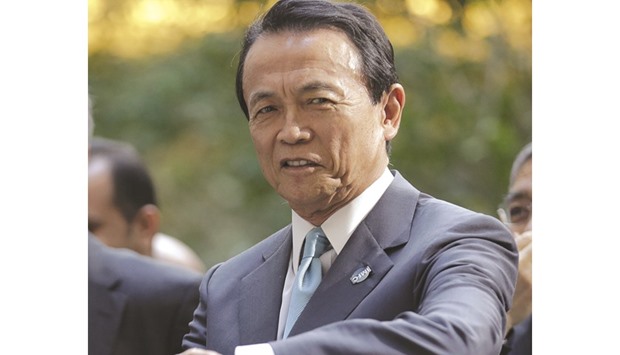The Bank of Japan’s policy is not affected by the international community’s pledges to avoid targeting exchange rates, Japanese Finance Minister Taro Aso said, adding that he told US Treasury Secretary Jack Lew of his “strong concern” about recent moves in the yen.
“The G20 has promised to avoid competitive devaluations, but this doesn’t apply to negative interest rates and other steps done for domestic policy purposes,” Aso said he told his counterparts at a Group of 20 meeting in Washington. Aso also said he and Lew agreed that excessive currency moves are undesirable.
The comments come as the Bank of Japan’s policy is under scrutiny both at home and abroad. The BoJ’s negative-rate policy was identified as a source of concern for some international officials at the G20’s last meeting in Shanghai.
The International Monetary Fund sees “no good reason” for Japan to intervene at this point, the fund’s mission chief in Tokyo said this week. The IMF’s chief, Christine Lagarde, said intervention is only justified in cases where “very disruptive volatility must be avoided.” She added there were cases where monetary support should be continued, as long as it was accompanied by structural reforms and fiscal policy.
Since the negative-rate policy was announced in January, the yen has strengthened. This has prompted some calls for the rate to be cut further, even as others suggest that introducing the policy was a mistake.
“There is a clear distinction between monetary policy and currency policy,” Takatoshi Ito, a former colleague of governor Haruhiko Kuroda, said in an interview. It’s hard for Japan to win understanding of a currency intervention now as other nations are also struggling with a weak demand, he said.
Kuroda has said that the bank’s monetary easing underpins stock prices and helps to weaken the yen, although at the same time, the bank also says it isn’t targeting foreign exchange rates. He told reporters in Washington that “excessive yen gains” have been somewhat corrected in recent days and that it is necessary to “monitor developments in the economy for a little while.” He also reiterated this week he will adjust policy without hesitation if needed.

Aso: Worried over strengthening yen.
